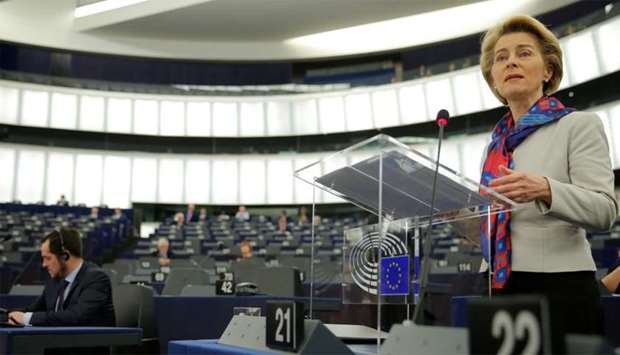The European Union's executive unveiled plans on Tuesday to leverage up to 1 trillion euros (1.11 trillion dollars) in the next decade to support its ambitious climate goals, aimed at achieving carbon neutrality by 2050.
European Commission President Ursula von der Leyen has made climate action a key priority. Last month she unveiled her flagship ‘European Green Deal,’ aimed at adapting the EU economy to whittle down the bloc's net carbon emissions to zero by 2050.
This target entails slashing carbon emissions generated by fossil fuels as well as finding ways of capturing or offsetting the remaining emissions.
However, her plan - which will require huge investment - hinges on participation from member states, which are locked in a bitter fight about the bloc's next long-term budget.
The Sustainable Europe Investment Plan, unveiled on Tuesday, foresees 7.5 billion euros (8.34 billion dollars) in new EU funding from 2021-27.
Further resources would be transferred from existing budget pots, while member states would have to co-finance projects, generating a funding capacity of 30-50 billion euros, the commission projects.
The so-called Just Transition Fund would be accompanied by two further financing pillars - from an existing EU investment programme and credits issued by the European Investment Bank - to access climate funding worth 100 billion euros during the next seven years.
The money will provide help for regions particularly reliant on pollutant fossil fuels such as coal, peat or shale gas. It will enable industries to adapt and workers to retrain, among other things. The funding will be available for all EU member states.
Almost 237,000 people work in coal-related activities across the EU, with a further 16,000 in peat extraction and the oil shale industry, according to the commission.
‘We know that you face a steeper path to climate neutrality,’ said commission Vice President Frans Timmermans as he presented the plan to the European Parliament.
By 2030, the commission wants to mobilize 1 trillion (1,000 billion) euros in green investment. This objective will rely on using public guarantees to attract private investments, a process the EU trialled successfully to stimulate economic growth and job creation.
However, even this is not considered to be enough. Reaching the EU's 2030 climate targets alone will require 260 billion euros annually in additional investments, according to the commission, with more funds needed to tackle issues such as biodiversity loss and cleaner air.
The proposals were welcomed on Tuesday by EU lawmakers, although some sounded a note of caution.
‘The EU commission is counting on billions of euros that are currently not available,’ said Green EU lawmaker Sven Giegold, warning against using fictitious figures to save the climate.
Environmental campaign group WWF said the the commission's funding plan is ‘crucial’ to secure backing for its climate ambitions. ‘It must support an inclusive move to climate-neutrality in those regions which most need it,’ said Katie Treadwell of WWF.

